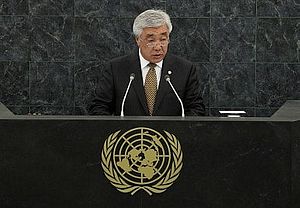The terrorist outrages in Aktobe in the west of Kazakhstan on June 5 once again underlined how no country, no matter how stable, is immune from the threat of depraved religious extremism. It is a tragic lesson that many nations have now learnt.
We are very grateful for the international sympathy and support we have received. We are pleased as well that media coverage around the globe rightly stressed how highly unusual terrorism was in our country.
Kazakhstan is located, of course, in a challenging region. But while our citizens come from many different backgrounds, we pride ourselves on having built a society where all are valued and live in harmony together. It is why the attacks were so profoundly shocking to us.
Our security forces, despite the casualties they have suffered, behaved with great bravery and professionalism, risking and, tragically, losing their lives to protect civilians. Without their sacrifice, the death toll would have been far higher.
All of the attackers have now been dealt with. A total of 18 of those involved in the attacks were killed by our security forces in special operations to detain them, while nine were captured. The investigation into what happened in Aktobe will still continue, however, to both determine the causes for this outbreak and make sure all the needed conclusions are made to prevent anything like this from happening again.
It is, however, already clear that those involved were local rather than having infiltrated from beyond our borders. This has made the shock over the attacks even greater.
What is less surprising is that they were motivated by the perverted religious extremism which lies behind so many terrorist outrages around the world. The extremists appear to be an isolated cell which has allied themselves to terror groups in the Middle East. Indeed, there is evidence that instructions for the attack came from outside Kazakhstan.
For if the attackers are local, the ideology that motivated them is certainly not. Kazakhstan is a largely Muslim if secular country in which people of all faiths can practice their religion freely. The hate-filled beliefs which foster terrorism have nothing in common at all with the moderate and peaceful Islamic faith which has deep roots in Kazakhstan.
But if the attackers hoped they would cause panic and divide Kazakhstan, they have failed badly. The response to these horrific outrages has been an outright rejection of any justification for the attacks and a calm but steely determination from President Nursultan Nazarbayev, to government to ordinary citizens that we will not allow extremism to undermine the stability and sustainable economic development of our country based on its openness to foreign investments and international cooperation.
What the Aktobe attacks, along with continued deaths and destruction across the world, has highlighted is the need to step up coordinated international action to counter both terrorism itself and the ideology which feeds it. Kazakhstan has been outspoken in its condemnation of violent extremism wherever it has taken place and has led demands to tackle the threat they pose to global peace and stability.
International terrorism, as our president has said, has become far more sinister in character moving from isolated acts to large scale aggression across frontiers and continents. He told the United Nations General Assembly in September that we must respond by creating a new global coalition to shape and deliver an effective anti-terrorism program.
Such a program must start with increased sharing of intelligence on terrorist activity and better cross-border co-operation between security forces. We also have to step up education efforts to counter extremist ideologies. Central to this goal is to prevent the misuse of religion to divide our world.
It is a cause we support strongly. Kazakhstan already hosts the increasingly influential Congress of Leaders of World and Traditional Religions. It provides a forum – attended last year by UN General Secretary Ban Ki-moon – for faith and political leaders to discuss and decide how to work better together to counter extremism through education and cross-religion initiatives.
But if these collective security and education efforts are to succeed, they must be coupled with determined actions to build a fairer, more prosperous and peaceful world. The easy answers offered by the extremists have most appeal when helplessness takes root.
So the international community must work harder to tackle poverty, promote development and opportunity and, above all, reduce conflict. It is why President Nazarbayev has called for a renewed focus on ending the violent disputes which are causing such destruction and despair around the world.
Kazakhstan is still coming to terms with the impact of the attacks in Aktobe. They have shocked our citizens and left children without parents. We are grateful for the global support we have received. But the best way to respond is for countries to redouble our collective efforts to counter terrorism and extremism in our world.
Erlan Idrissov is the Foreign Minister of Kazakhstan.

































